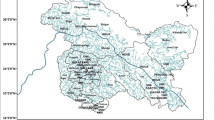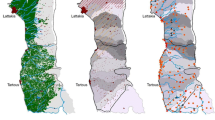Abstract
Considering the finite volume of freshwater resources, its sustainable management is a global challenge. Due to various factors ranging from natural disturbance in hydrological regime to poor governance, about 33% of global population currently live in water stress conditions and this number will go upto 67% by 2050 if no adaptation and mitigation measures are timely considered (Vörösmarty et al., 2010). On the other hand, rapid population increase, economic growth, and urbanization are putting further stress on fresh water availability (Kumar et al., 2018). Variability of climatic conditions in the tropical Indian and Pacific Oceans are also dominated by the Indian Ocean Dipole (IOD) and El Nino Southern Oscillations (ENSO). They both have huge impact on Asian region through inducing hydro-meteorological hazards and its induced health impacts (from water borne diseases like cholera). Since last three decades, approximately 3.2 million people killed in countries like India, Bangladesh and Vietnam only because of ENSO and IOD induced hazards (Masahiro et al., 2010; Tamaddun et al., 2019). With increasing nature and anthropogenic interferences and management efforts, hydrology of different landscapes around the world has significantly changed, and which has significant impact on both water resources and socio-cultural attributes deeply associated with water (Blair and Buytaert, 2016).
Access this chapter
Tax calculation will be finalised at checkout
Purchases are for personal use only
Similar content being viewed by others
References
ADB (Asian Development Bank). The Rise of Natural Disasters in Asia and the Pacific: Learning from ADB’s Experience; ADB: Mandaluyong, Philippines, 2013.
Arnell, N.W. and Gosling, S.N. (2013). The impacts of climate change on river flow regimes at the global scale. Journal of Hydrology, 486: 351-364, doi: https://doi.org/10.1016/j.jhydrol.2013.02.010.
Baker, T.J., Cullen, B., Debevec, L. and Abebe, Y. (2015). A socio-hydrological approach for incorporating gender into biophysical models and implications for water resources research. Applied Geography, 62: 325-338.
Baldassarre, D., Viglione, G.A., Carr, G., Kuil, L., Yan, K., Brandimarte, L. and Bloschl, G. (2015). Debates—Perspectives on socio-hydrology: Capturing feedbacks between physical and social processes, Water Resour. Res., 51: 4770-4781, doi:https://doi.org/10.1002/2014WR016416.
Baldassarre, D., Sivapalan, M., Rusca, M., Cudennec, C., Garcia, M., Kreibich, H. et al. (2019). Socio-hydrology: Scientific challenges in addressing the sustainable development goals. Water Resources Research, 55: 6327-6355. https://doi.org/10.1029/2018WR023901.
Blair, P. and Buytaert, W. (2016). Socio-hydrological modelling: a review asking “why, what and how?” Hydrol. Earth Syst. Sci., 20: 443-478.
Ferguson, L., Chan, S., Santelmann, M.V. and Tilt, B. (2018). Transdisciplinary research in water sustainability: What’s in it for an engaged researcher-stakeholder community? Water Alternatives, 11(1): 1-18.
Intergovernmental Panel on Climate Change (IPCC) (2014). Climate Change 2014: Synthesis Report. Contribution of Working Groups I, II and III to the Fifth Assessment Report of the Intergovernmental Panel on Climate Change [Core Writing Team, R.K. Pachauri and L.A. Meyer (eds.)]. IPCC, Geneva, Switzerland.
Jamero, M.L., Onuki, M., Esteban, M., Billones-Sensano, XK., Tan, N., Nellas, A., Takagi, H., Thao, N.D. and Valenzuela, V.P. (2017). Small-island communities in the Philippines prefer local measures to relocation in response to sea-level rise Nature Climate Change, 7: 581-586.
Kumar, P., Masago, Y., Mishra, B.K. and Fukushi, K. (2018). Evaluating future stress due to combined effect of climate change and rapid urbanization for Pasig-Marikina River, Manila. Groundwater for Sustainable Development. 6: 227-234.
Masahiro, H., Faruque, A. S. G., Terao, T., Yunus, M., Streatfield, P.K., Yamamoto, T. and Moji, K. (2010). The Indian ocean dipole and cholera incidence in Bangladesh: A time series analysis, Environmental Health Perspectives, 119(2): 239-244.
Mishra, B.K., Rafiei Emam, A., Masago, Y., Kumar, P., Regmi, R.K. and Fukushi, K. (2017). Assessment of future flood inundations under climate and land use change scenario in Ciliwung river basin, Jakarta. Journal of Flood Risk Management. Taylor and Francis Publication. Doi:https://doi.org/10.1111/jfr3.12311
Mukate, S., Panaskar, D., Wagh, V., Muley, A., Jangam, C. and Pawar, R. (2017). Impact of anthropogenic inputs on water quality in Chincholi Industrial area of Solapur, Maharashtra, India. Groundw. Sustain. Dev. https://doi.org/10.1016/j.gsd.2017.11.001.
Nakicenovic, N., Alcamo, J., Grubler, A., Riahi, K., Roehrl, R.A., Rogner, H.H. and Victor, N. (2000). Special report on emissions scenarios (SRES), a special report of Working Group III of the intergovernmental panel on climate change. Cambridge University Press.
Pahl-Wostl, C. (2009). A conceptual framework for analyzing adaptive capacity and multi-level learning processes in resource governance regimes, 19: 354-365.
Palmer, P.I. and Smith, M.J. (2014). Earth systems: Model human adaptation to climate change. Nature, 7515: 365-366.
Sivapalan, M. et al. (2014). Socio-hydrology: use-inspired water sustainability science for the Anthropocene. Earth’s Future, 2 (4), 225–230. doi:https://doi.org/10.1002/2013EF000164
Srinivasan, V., Sanderson, M., Garcia, M., Konar, M., Blöschl, G. and Sivapalan, M. (2017). Prediction in a socio-hydrological world, Hydrological Sciences Journal, 62(3): 338-345, DOI: https://doi.org/10.1080/02626667.2016.1253844
Tamaddun, K. A., Kalra, A., Bernardez, M. and Ahmad, S. (2019). Effect of ENSO on temperature, precipitation and potential evapotranspiration of North India’s Monsoon: an analysis of trend and entropy, Water, 11: 189, doi:https://doi.org/10.3390/w11020189.
Vörösmarty, C.J., McIntyre, P.B., Gessner, M.O., Dudgeon, D., Prusevich, A., Green, P., Glidden, S., Bunn, S.E., Sullivan, C.A. and Liermann, C.R. (2010). Global threats to human water security and river biodiversity. Nature, 467: 555 doi:https://doi.org/10.1038/nature09440.
Wesselink, A., Kooy, M. and Warner, J. (2017). Socio-hydrology and hydrosocial analysis: Toward dialogues across disciplines. WIREs, Water, 4: e1196
WWAP (United Nations World Water Assessment Programme) (2015). The United Nations World Water Development Report 2015: Water for a Sustainable World. Paris, UNESCO.
ACKNOWLEDGEMENT
This work is supported by Asia Pacific Network (APN) Collaborative Regional Research Programme (CRRP) project with project reference number CRRP2019-01MY-Kumar.
Author information
Authors and Affiliations
Corresponding author
Editor information
Editors and Affiliations
Rights and permissions
Copyright information
© 2022 Capital Publishing Company, New Delhi, India
About this chapter
Cite this chapter
Kumar, P., Dasgupta, R., Avtar, R. (2022). Socio-hydrology: A Holistic Approach to Water-Human Nexus in Large Riverine Islands of India, Bangladesh and Vietnam. In: Mukherjee, A. (eds) Riverine Systems. Springer, Cham. https://doi.org/10.1007/978-3-030-87067-6_14
Download citation
DOI: https://doi.org/10.1007/978-3-030-87067-6_14
Published:
Publisher Name: Springer, Cham
Print ISBN: 978-3-030-87066-9
Online ISBN: 978-3-030-87067-6
eBook Packages: Earth and Environmental ScienceEarth and Environmental Science (R0)




